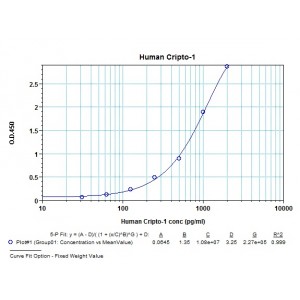Data sheet
| Assay Range | 62.5-4000pg/ml |
More info
Assay Range | 62.5-4,000 pg/mL |
Assay Time | 4 hours 40 minutes |
Specificity | No cross-reaction with other related substances detected |
Size | 96T |
Storage | Store at 2 - 8ºC. Keep reconstituted standard and detection Ab at -20 ºC |
Assay Principle | Sandwich ELISA |
Sample Volume | 100 µL final volume, dilution factor varies on samples |
Detection Method | Chromogenic |
Kit Components
1. Human Cripto-1 standard: 2 vials
2. One 96-well plate coated with Human Cripto-1 Ab
3. Sample diluent buffer: 12 mL - 1
4. Detection antibody: 1 vial
5. Streptavidin-HRP: 1 vial
6. Antibody diluent buffer: 12 mL x1
7. Streptavidin-HRP diluent buffer: 12 mL x1
8. TMB developing agent: 10 mL x1
9. Stop solution: 10 mL x1
10. Washing solution (20x): 25 mL x1
11. Adhesive plate sealers: 2
12. Package insert: 1
Background
The human embryonic gene Cripto-1 (also known as TDGF-1, Teratocarcinoma-Derived Growth Factor) is a member of the Epidermal Growth Factor (EGF)/ Cripto-1/FRL1/Cryptic protein (CRC) family of signaling proteins that function in various developmental processes. Cripto-1 is expressed as a membrane-bound molecule and subsequently released in soluble form and both the membrane-bound and soluble Cripto-1 are functional. It is essential for signaling by Nodal, a key morphogen in embryonic development. Together, Cripto and Nodal control various processes in the embryonic development like formation of primitive streak, establishment of left-right axis and mesendoderm induction. As a result, deletion of the mouse Cripto-1 gene by homologous recombination during embryonic development is lethal and mouse embryos die around day 6.5 of embyogenesis as a result of defects in mesoderm formation, axial organization and cardiac development. In addition, human Cripto-1 is expressed in various embryonic stem cell lines and in induced pluripotent stem cells. It is overexpressed in various types of cancers and promotes proliferation of cancer cells, metastasis, and angiogenesis. Multiple pathways control the expression of human Cripto-1. It has been shown that Cripto-1 expression is activated by NANOG, OCT4, β-catenin, HIF-1α and is repressed by germ cell nuclear factor (GCNF). Recent evidence recognizes Cripto-1 as a biomarker for breast and colon cancers, cardiac ischemia and chronic inflammatory diseases.


